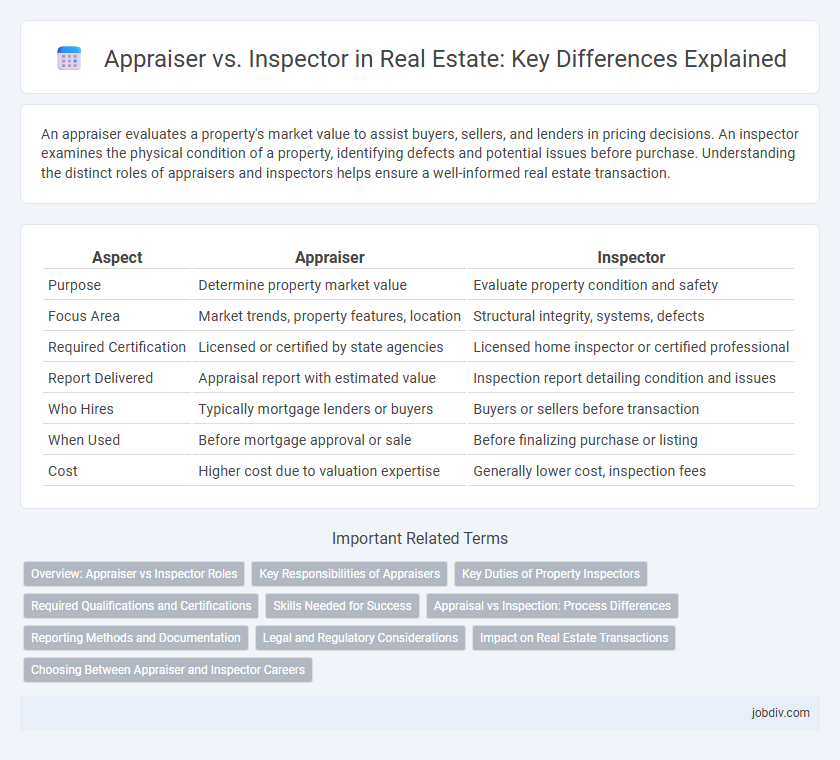An appraiser evaluates a property's market value to assist buyers, sellers, and lenders in pricing decisions. An inspector examines the physical condition of a property, identifying defects and potential issues before purchase. Understanding the distinct roles of appraisers and inspectors helps ensure a well-informed real estate transaction.
Table of Comparison
| Aspect | Appraiser | Inspector |
|---|---|---|
| Purpose | Determine property market value | Evaluate property condition and safety |
| Focus Area | Market trends, property features, location | Structural integrity, systems, defects |
| Required Certification | Licensed or certified by state agencies | Licensed home inspector or certified professional |
| Report Delivered | Appraisal report with estimated value | Inspection report detailing condition and issues |
| Who Hires | Typically mortgage lenders or buyers | Buyers or sellers before transaction |
| When Used | Before mortgage approval or sale | Before finalizing purchase or listing |
| Cost | Higher cost due to valuation expertise | Generally lower cost, inspection fees |
Overview: Appraiser vs Inspector Roles
Appraisers determine the market value of a property using comprehensive analysis of comparable sales, property condition, and location factors. Inspectors evaluate the physical condition of the property, identifying structural, mechanical, and safety issues through detailed inspections. Both professionals provide essential insights, with appraisers focusing on financial valuation and inspectors on property condition assessment.
Key Responsibilities of Appraisers
Appraisers evaluate a property's market value by analyzing comparable sales, location, condition, and economic trends to provide an unbiased estimate crucial for mortgage lending, investment decisions, and tax assessments. They conduct thorough on-site inspections, document property features, and prepare detailed appraisal reports adhering to industry standards and regulatory guidelines. Accurate appraisals ensure fair transactions by reflecting true market conditions and preventing financial risks for buyers, sellers, and financial institutions.
Key Duties of Property Inspectors
Property inspectors conduct thorough visual examinations of a property's physical condition, identifying issues related to structural elements, roofing, plumbing, electrical systems, and HVAC components. Their key duties include detecting safety hazards, code violations, and signs of potential future damage to provide buyers and sellers with a detailed report. This inspection helps stakeholders make informed decisions and negotiate repairs before closing a real estate transaction.
Required Qualifications and Certifications
Appraisers must obtain state certification or licensure, often requiring completion of accredited education programs, supervised experience hours, and passing the Uniform Standards of Professional Appraisal Practice (USPAP) exam. Inspectors typically need to be licensed or certified according to state regulations, which may involve completing industry-specific training, passing standardized exams, and maintaining continuing education. Both roles demand adherence to professional standards, but appraisers focus on valuation qualifications while inspectors specialize in structural and systems knowledge.
Skills Needed for Success
Appraisers require strong analytical skills and attention to detail to accurately assess property values based on market trends, comparable sales, and property conditions. Inspectors must possess a thorough knowledge of building systems, construction methods, and safety standards to identify potential issues and ensure compliance. Both roles demand excellent communication skills to effectively convey findings to clients and stakeholders.
Appraisal vs Inspection: Process Differences
Appraisal involves a licensed appraiser evaluating a property's market value through detailed analysis of comparable sales, location, and condition, primarily used for lending and sale purposes. Inspection entails a certified home inspector assessing the physical condition of a property's systems and structure to identify defects or safety issues for buyer awareness. While appraisal focuses on monetary value estimation, inspection centers on the property's operational status and maintenance needs.
Reporting Methods and Documentation
Appraisers produce detailed, standardized appraisal reports highlighting market value, property condition, and neighborhood data, following Uniform Standards of Professional Appraisal Practice (USPAP) guidelines. Inspectors generate comprehensive inspection reports documenting property physical conditions, identifying defects, safety hazards, and maintenance issues, often including photos and repair recommendations. Both rely on structured templates but serve distinct purposes: appraisers focus on valuation, while inspectors emphasize condition and safety assessments.
Legal and Regulatory Considerations
Appraisers must comply with the Uniform Standards of Professional Appraisal Practice (USPAP) and state licensing requirements, ensuring their valuations meet legal and regulatory standards for mortgage lending. Inspectors follow state-specific licensing laws and adhere to the standards set by organizations such as the American Society of Home Inspectors (ASHI) to provide accurate condition reports. Both roles have distinct regulatory frameworks that protect consumers and maintain market integrity in real estate transactions.
Impact on Real Estate Transactions
Appraisers determine the market value of a property by analyzing comparable sales, which directly influences loan approval and pricing decisions in real estate transactions. Inspectors evaluate the physical condition and safety of the property, identifying defects that may impact buyer confidence or negotiation terms. Both roles ensure informed decision-making, reducing transaction risks and protecting stakeholders' investments.
Choosing Between Appraiser and Inspector Careers
Choosing between careers as a real estate appraiser or an inspector depends on your interest in property valuation versus structural evaluation. Appraisers focus on determining market value by analyzing comparable sales and property conditions, requiring strong analytical and report-writing skills. Inspectors specialize in assessing the physical condition and safety of buildings, emphasizing attention to detail and knowledge of construction standards and local building codes.
Appraiser vs Inspector Infographic

 jobdiv.com
jobdiv.com